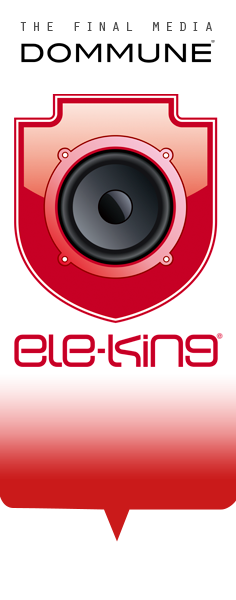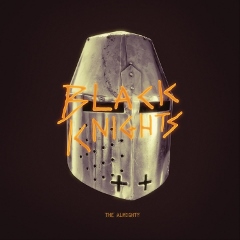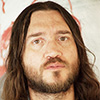MOST READ
- Bandcamp ──バンドキャンプがAI音楽を禁止、人間のアーティストを優先
- interview with Sleaford Mods 「ムカついているのは君だけじゃないんだよ、ダーリン」 | スリーフォード・モッズ、インタヴュー
- Columns Introduction to P-VINE CLASSICS 50
- 別冊ele-king 坂本慎太郎の世界
- DADDY G(MASSIVE ATTACK) & DON LETTS ——パンキー・レゲエ・パーティのレジェンド、ドン・レッツとマッシヴ・アタックのダディ・Gが揃って来日ツアー
- Daniel Lopatin ──映画『マーティ・シュプリーム 世界をつかめ』のサウンドトラック、日本盤がリリース
- Ken Ishii ──74分きっかりのライヴDJ公演シリーズが始動、第一回出演はケン・イシイ
- DJ Python and Physical Therapy ──〈C.E〉からDJパイソンとフィジカル・セラピーによるB2B音源が登場
- Autechre ──オウテカの来日公演が決定、2026年2月に東京と大阪にて
- Masaaki Hara × Koji Murai ──原雅明×村井康司による老舗ジャズ喫茶「いーぐる」での『アンビエント/ジャズ』刊行記念イヴェント、第2回が開催
- interview with bar italia バー・イタリア、最新作の背景と来日公演への意気込みを語る
- aus - Eau | アウス
- 見汐麻衣 - Turn Around | Mai Mishio
- ポピュラー文化がラディカルな思想と出会うとき──マーク・フィッシャーとイギリス現代思想入門
- 橋元優歩
- Geese - Getting Killed | ギース
- Ikonika - SAD | アイコニカ
- interview with Ami Taf Ra 非西洋へと広がるスピリチュアル・ジャズ | アミ・タフ・ラ、インタヴュー
- interview with Kneecap (Mo Chara and Móglaí Bap) パーティも政治も生きるのに必要不可欠 | ニーキャップ、インタヴュー
- Dual Experience in Ambient / Jazz ──『アンビエント/ジャズ』から広がるリスニング・シリーズが野口晴哉記念音楽室にてスタート
Home > Columns > ジョン・フルシアンテ、問題作『レター・レファー』『PBXファニキュラー・インタグリオ・ゾーン』への思い- ――ブログ全文訳掲載! 5年越し「プログレッシヴ・シンセ・ポップ」の構想を語る
ジョン・フルシアンテ、問題作『レター・レファー』『PBXファニキュラー・インタグリオ・ゾーン』への思い
――ブログ全文訳掲載! 5年越し「プログレッシヴ・シンセ・ポップ」の構想を語る
Aug 31,2012 UP
Part.2
Album Titles
「PBX」は内部のコミュニケーション・システムを意味する。自然界だと、ビジネスやオフィスではなく人間の内部にも似たようなシステムがある。「Funicular(フニキュラー)」とは、ふたつのケーブルカーが1本のケーブルに繋がれていて、ひとつのケーブル・カーが上がるときに、もう1台が下がる仕組みのことだ。音楽というのは、さまざまなレベルで常にそれと似たことが起きている。「Intaglio(インタリオ、沈み彫り)」は彫刻におけるひとつのテクニックなのだが、彫刻家が作品の裏側から彫ることで、徐々に見物人には前面から肖像がレリーフで見えるようになる。しかし彫刻家は、前面とは対極のアングルから肖像を彫っているわけだ。僕が魅力を感じる音楽には、これに似たアプローチが取り入れられていて、このアプローチが多ければ多いほど好きになるのだ。「Zone」は、自分の感情と身の回りの環境が一体化し、他の世界がすべて消えてしまう心理状態のことだ。この4つの言葉を組み合わせることで、僕のクリエイティブ・プロセスを深いところまで描写できるのだ。
「Letur-Lefr(レター・レファー)」という言葉は、ふたつの異なるものが連結部分によってひとつになることを意味している。それは、アルバムの1曲目がアルバムの最終曲の続編であることに象徴されている。
PBX refers to an internal communication system. There is a natural version of this, wherein the “business or office” is a person. A funicular involves two trams connected by a cable, one going up while the other goes down. All music perpetually does this on many levels simultaneously. Intaglio is a technique in sculpture where one works on the opposite side of the image, whereby the image will eventually appear to the spectator in relief, but the angle the sculptor works from is the negation of that. In music that I like, an approach analogous to this was employed, the more so the better. Zone refers to a state of mind wherein the rest of the world seemingly disappears, and nothing matters but the union of one’s immediate surroundings with one’s feelings. These four words linked together go far to describing my creative process.
Letur-Lefr for me signifies the transition of two becoming one, notably symbolized by the first song on the album being the sequel to the album’s last.
Part.3
My Recent History
エレクトロニック・ミュージックを作り、エンジニア作業もすべて自分で手掛けたいという夢を実現することに、5年前から真剣に取り組みはじめた。その10年前から、僕はさまざまなタイプのシンセサイザー・ミュージックやサンプリング・ミュージックを模倣してギターをプレイしていた。マシンの言語は、マシンをプログラミングする人に新たな音楽ボキャブラリーを与えたことに気がついた。過去22年間に生み出されたエレクトロニック・ミュージックは、新たなリズム、メロディ、ハーモニーの原理を導入した。以前はプログラミングで作られたエレクトロニック・ミュージックを聴いても、どのようなプロセスで曲が作られたかが解明できなかった。80年代のマシンや、90年代のトラッカー・ソフトウェアを熟知している人たちは、理論的なアプローチでプログラミングをしていたが、僕がポップ/ロック、ジャズ、クラシックから知っていた理論とはちがう体系のものだった。手と楽器の密接な関係性は、ミュージシャンが作り出す音楽の基礎となっているが、ポップ/ロックを演奏する上で、自分の頭が手によってコントロールされている傾向が強いことに気づいて、それを修正したいと強く願っていた。マシンの知能と人間の知能が刺激し合って、その相互作用によって生まれる音楽に僕は強い関心を抱くようになった。
2007年から僕はアシッドハウスで使用される機材やハードウェアのプログラミングを学ぶようになった。7ヶ月間は何もレコーディングしなかった。その後は、10個の機材を同期させ、ミキサーに通してCDバーナーに録音するようになった。最初は実験的アシッドハウス・ミュージックを作っていたが、ロック・ミュージックで学んだスキルはいっさい使わなかった。僕は伝統的なソングライティングに興味を失って、音楽をクリエイトする新たな方法を見つけたいと感じていた。マシンに囲まれ、次々とマシンをプログラミングし、その興味深いプロセスを楽しんだ。それまでは筋肉を使って楽器を演奏していたが、同様に数字を使ってマシンをプログラミングする作業が楽しくなった。数学的で理論的な方法でリズム、メロディ、サウンドに取り組むようになったため、これまで無意識に使っていたスキルが徐々に意識的になった。
その後は2人の友人と演奏するようになったわけだが、これまでひとりでリビング・ルームでやっていたことを仲間とやるようになった。この編成はいまでも僕の性分に合うバンドだと考えている。
仲間と演奏するようになった直後から、僕はコンピューターを使用するようになった。最初は、僕がハードウェアで作り出していた音をレコーディングするためにコンピューターを使っているだけだったが、徐々にコンピューターがメインの楽器になった。僕の制作方法と考え方に特化した理想的なスタジオも同時に作り始めた(この作業は今も進行中)。この時期に作っていた音楽はCDバーナーに録音していた音楽よりも冒険的なインスト・アシッドハウスだった。コンピューターで2曲レコーディングしてから、自分が作り出している新しい音楽が“プログレッシヴ・シンセ・ポップ”という言葉にふさわしいと感じはじめた。当時作っていた音楽では、アシッドが中心的要素だった。
1年ほどコンピューターを音楽制作に使うようになってから、自分のヴォーカルを導入するようになった。それまでは、ギターとヴォーカルをエレクトロニックに取り入れたくないと考えていた。僕が大好きなタイプのエレクトロニックのルールに基づいた音楽を作りたいと思っていたからだ。ギターとヴォーカルをエレクトロニック・ミュージックとミックスすると、以前僕がやっていたポップ/ロック・ミュージックのソングライティングとギターのルールに戻ってしまうから、避けたかった。エレクトロニック・ミュージックをギターやヴォーカルとブレンドしたら、エレクトロニクスが僕の曲、ヴォーカル、ギターの補助的な役割になってしまうと考えていた。そのアイデアには不快感を覚えた。僕はロック・ミュージシャンとしての経験が長かったので、ロックのルールが優先されてしまい、新しいことを発見するペースが遅れてしまうと考えていた。“ルール”という言葉を使うときは、特定の音楽スタイルを定義づけ、その境界線を設定する根本的原理や抽象的現象を指しているわけであって、その境界線のなかで人間はクリエイティブな探求をしているわけだ。
ソングライティングは続けていたが、必要性を感じたときに、そしてその方法で表現しなければいけないときに曲を書くようにしていた。僕は長年、曲を量産することでソングライティングのスキルを磨くものだと考えていたが、それが違うということに気がついた。最近は、ソングライティングというのは呼吸のように、自然に起きるものだということが分かった。最初のうちは、事前に作曲した曲をレコーディングする作業が窮屈のように思えたが、新たな曲作りのメソッドを吸収し、プログラミングのスキルとスピードも上達していたので、インストを作っていたときと同じくらいヴォーカルとギター入りの曲のレコーディングが楽しくなった。この時期に『Letur-Lefr』の曲をレコーディングし始めた。このときはまだロックの要素は遠ざけていたが、R&Bとヒップホップは自然と僕がやりたかった音楽にブレンドできることがわかった。ソングライティングとプログラミングを統合する上で、R&Bは有効な方法だということに気がついた。ヴォーカルがインスト・トラックを支える曲作りの方法を見つけることができたわけだが、その逆ではないことが僕にとって重要だった。
この時期が経過すると、僕は新たなアプローチでギターを演奏するコンセプトを練り始めた。そのために定期的な練習が必要だった。その数年前は、レイヴやシンセ・ポップのレコードに合わせて練習することが多かった。僕がやりたかった音楽では必要性を感じていなかったため、ギターを演奏するための筋肉を訓練させるような練習はしたくなかった。僕の妻のセカンド・アルバムで特定の演奏法がしたかったので、定期的に練習していた。しかし、その後に僕はまったく新しいギター演奏のアプローチを発見することができた。僕のメインのエレクトロニック楽器はMC-202だったが、最初の頃は202をプログラミングするときは、ギターの知識を使ってプログラミングしていた。しかし、長く202を使ったことで、僕のギタリストとしての知識と202奏者としての知識が同じレベルになり、僕のギター演奏が202のプログラミング方法に影響されるようになっていた。ギターを演奏するとき、ロック・ミュージシャンとしての指と筋肉の使い方から完全に離れることができるようになっていた。違うギターに変えたということもあるが(Yamaha SG)、202を使うときは指のポジションによって音符を演奏するわけではないので、そのアプローチによってギターを演奏する新しいアイデアが芽生えていた。この時点から、ギターが完全に僕がやろうとしている新しい音楽と一体になった。ギターに対する新しいアプローチが見つかり、音を加工する新たなテクニックを吸収していたので、シンセ、シーケンサー、ドラム・マシンに対するエキサイトメントをギターにも向けられるようになった。したがって、僕はロック/ポップスの音楽理論を他の好きな音楽要素と同じように、僕の音楽に応用できるようになった。考え方が変化したので、クリシェを避けることを意識する必要もなくなった。新しい癖が身についていたので、そこから様々な新しい音楽的方向に進むことができた。古い癖は完全に捨て去っていた。コンピューターも完全に僕にとって楽器になっていたので、ドラムンベース(そしてその他の作りたかった音楽的スタイル)も僕の音楽に完全に取り入れられるようになっていた。この時期から、僕は過去のエンジニアリング・スタイルを理解できるようになっていたので、新旧のプロダクション・スタイルを、様々な音楽スタイルと同様に組み合わせられるようになった。数ヶ月が経過すると、僕は『PBX Funicular Intaglio Zone』をレコーディングし始めた。何年間も僕は1曲ずつ制作するアプローチをとっていたが、新たなプロダクションの経験を積んだことで、ひとつの作品のコンセプトの中で完全に没頭しながら制作できるようになっていた。この時期から僕が長らく求めていたバランスを見つけることができた。ボーカルと曲の構造があっても、ミュージシャンとして完全に自由でいられる境地に達していた。
『PBX』では僕が何年も前に頭の中で想像していた音楽的要素の組み合わせが実現しているが、当時はどうやって形にすればいいか分からなかった。純粋に音楽に取り組むチャンスを与えられたことが幸運だと思っているし、音楽ビジネスの中に長年いても、音楽に集中することができたことに感謝している。僕は長年レコードを聴きながら演奏したり、曲を書いたり、夢見ることにほとんどの時間を費やすことができた。それを手助けしてくれた人々にとても感謝している。
最後に、アシッド・ミュージックは僕にとってよい出発点となった。そこから徐々に、僕はワンマン・バンドとしてあらゆる音楽的スタイルを自由に組み合わせられるようになったわけだから。
ジョン
I started being serious about following my dream to make electronic music, and to be my own engineer, five years ago. For the 10 years prior to that, I had been playing guitar along with a wide range of different types of programmed synthesizer and sample based music, emulating as best as I could, what I heard. I found that the languages machines forced programmers to think in had caused them to discover a new musical vocabulary. The various forms of electronically generated music, particularly in the last 22 years, have introduced many new principles of rhythm, melody, and harmony. I would learn what someone had programmed but their thought process eluded me. Programmers, particularly ones fluent on machines from the early 80s and/or tracker programs from the 90s, clearly had a theoretical foundation in their employ but it was not the theory I knew from pop/rock, jazz or classical. The hands relationship to the instrument accounts for so much of why musicians do what they do, and I had come to feel that in pop/rock my mind was often being overpowered by my hand, which I had a strong desire to correct. I was obsessed with music where machine intelligence and human intelligence seemed to be bouncing off one another, each expanding with the incorporation of what it received from the other.
In 2007 I started to learn how to program all the instruments we associate with Acid House music and some other hardware. For about 7 months I didn’t record anything. Then I started recording, playing 10 or so synced machines through a small mixer into a CD burner. This was all experimental Acid House, my skills at making rock music playing no part in it whatsoever. I had lost interest in traditional songwriting and I was excited about finding new methods for creating music. I’d surround myself with machines, program one and then another and enjoy what was a fascinating process from beginning to end. I was so excited by the method of using numbers much in the same way I’d used my muscles all my life. Skills that had previously been applied by my subconscious were gradually becoming conscious, by virtue of having numerical theoretical means of thinking about rhythm, melody and sound.
Then I began a musical relationship with two friends, wherein I could do basically the same thing I had been doing in my living room, only with other people. This continues to be a band which is perfectly congruent with my nature.
Right after we started playing together I started using a computer. Initially it was just something to record what I was doing with hardware but it eventually became one of my main instruments. I gradually built up a studio ideally set up for the specific ways I work and think (this is a continual work in progress). The music I did at this stage was a more adventurous kind of instrumental Acid House than what I’d been doing onto CD, and by the time I recorded my second song on a computer, I was aware that Progressive Synth Pop was an accurate description of what I was doing. Acid was nevertheless the central musical style involved.
After a year or so on the computer, I occasionally began using my voice again. Prior to this, incorporating guitar and singing had posed a problem because I wanted to make music based on the rules, as I perceived them ? inherent in the various kinds of electronic music I loved ? and did not want to blend this with what I previously did with songwriting and guitar wherein many rules of pop/ rock music would then naturally be employed. If I’d attempted to blend the two at that time my electronics would have served as support to my songs, voice, and guitar. This idea was repugnant to me. Because I was so much more developed as a rock musician, rocks characteristics and rules would have dominated, thereby slowing down the rate at which I was discovering new things. To be clear, when I say rules, I mean the underlying principles and abstract phenomena which define a particular style, marking its boundaries and limits, within which exists an area proven to be worthy of human creative investigation.
I continued to write songs, but only when I had to out of necessity, because something had to be expressed that way. I no longer looked at songwriting as a craft to prolifically hone, as I had for so long. In these recent years, it is just something that happens sometimes, a natural thing, like breathing. At first, recording pre-written songs felt like a restriction, but I eventually found myself having acquired enough new work methods of my own and enough skill and speed at programming that when I recorded a pre-written song I had as much fun as when I made instrumentals. This is the point at which the tracks on Letur-Lefr were recorded. I was still steering clear of most rock music characteristics, but R&B and Hip Hop were blending well with the various types of music I was combining. R&B seemed to me a path through which to integrate my songwriting with my programming, being that I could do it in such a way that the song served as support for the things I was doing instrumentally ? and not the other way around ? which was very important to me.
As this phase passed, I began developing a concept for a new approach to playing guitar, which required regular practice. For the preceding couple of years, practice consisted of playing along with this or that Rave or Synth Pop record or whatever. I didn’t see a point in developing my playing musculature-wise because there was no call for that kind of playing in my music. I originally was practicing in a disciplined manner because I wanted to play a specific way on my wife’s second record. But I found an approach to the instrument, which was brand new for me, in which I saw a lot of room to grow. My main melodic electronic instrument being the MC-202, I had gone through a long period where my knowledge of guitar informed much of my 202 programming. But I had now reached a point where I thought as much like a 202ist as I did a guitarist, and my guitar playing was now being informed by my knowledge of the 202. I was using the muscles I was developing in a way completely divorced from the way I used them as a rock musician, partially because I switched to a different type of guitar (a Yamaha SG), but mainly because my musical ideas stemmed from my understanding of an instrument on which the choice of notes is not limited by the position of ones hand. So at this point guitar became fully integrated into my music. The combination of having a new approach to the instrument, combined with all the ways I was now well versed at processing sound, resulted in my having the same excitement about guitar that I had long had for my synths, sequencers and drum machines. This, and other factors, resulted in my being able to pick and choose specific musical principles from rock/pop to apply to my music, just as I had been applying specific aspects of every other type of music I love. I no longer had to be concerned with avoiding cliches because I just didn’t think that way anymore. I had developed new habits which were taking me all kinds of new places, and the old habits were now foreign to me. Also the computer had now become an instrument for me, so Drum n’ Bass (as well as a number of other styles I’d been reaching for) had now become fully integrated into my music. At this point, I also had begun to grasp the characteristics of engineering styles of the past, allowing me to combine aspects of old and modern styles of production just as I’d been combining different styles of music.
A few months into this period, I began the recording of PBX Funicular Intaglio Zone. For years I had just approached everything one song at a time, but my experience in production now allowed me to comfortably work within a record concept while remaining completely absorbed in the process. By this time, I had found the balance that I’d been searching for, wherein the presence of a vocal and the structure of a written song actually provided me with additional freedoms as a musician.
Aspects of PBX are the realization of combinations of styles of music I saw in my head many years ago, as potentials, but which I had no idea how to execute. I’m so happy that I’ve had the opportunity to focus exclusively on music for music’s sake, and also so thankful that I got to spend all those years active in the music business whilst keeping my head in music all the time. I was free to spend most of my time playing along with records, writing, and dreaming. I have so much gratitude for everyone who made that possible.
In summary, Acid served as a good starting point for me, very gradually leading me to be able to combine whatever styles of music I want, as a one man band.
- John
(訳:バルーチャ・ハシム)
COLUMNS
- Columns
Introduction to P-VINE CLASSICS 50 - heykazmaの融解日記
Vol.3:≋師走≋ 今年の振り返り- WAIFUの凄さ~次回開催するパーティについて˖ˎˊ˗ - Columns
12月のジャズ- Jazz in December 2025 - Columns
2025年のFINALBY( ) - Columns
11月のジャズ- Jazz in November 2025 - Columns
Oneohtrix Point Never 『Tranquilizer』- 3回レヴュー 第二回目 - Columns
Oneohtrix Point Never 『Tranquilizer』- 3回レヴュー 第一回目 - Columns
なぜレディオヘッドはこんなにも音楽偏執狂を惹きつけるのか- Radiohead, Hail to the Thief Live Recordings 2003-2009 - テリー・ジョンスンのヘタうまダイアリー 命日日記
10月28日 川上哲治(プロ野球選手) - Columns
10月のジャズ- Jazz in October 2025 - heykazmaの融解日記
Vol.1:はろはろheyhey!happy halloween~~ッッッ ₊˚🎃♱‧₊˚. - Columns
Wang One- 中国ネット・シーンが生んだエレクトロニック・デュオ - Columns
Terry Riley- サイケ、即興、純正律——テリー・ライリー事始め - Columns
英フリー・インプロヴィゼーションの巨匠、その音との向き合い方- ──エディ・プレヴォ来日公演レポート&インタヴュー - テリー・ジョンスンのヘタうまダイアリー 命日日記
9月30日 レツゴー正司(レツゴー三匹) - Columns
9月のジャズ- Jazz in September 2025 - 日本のジャズを彩った音楽家たち
第二回:服部良一はジョージ・ガーシュウィンを目指す!? - テリー・ジョンスンのヘタうまダイアリー 命日日記
8月28日 岸部四郎 - Columns
8月のジャズ- Jazz in August 2025 - 日本のジャズを彩った音楽家たち
第一回(前編):服部良一と小西康陽の奇妙な縁


 DOMMUNE
DOMMUNE






